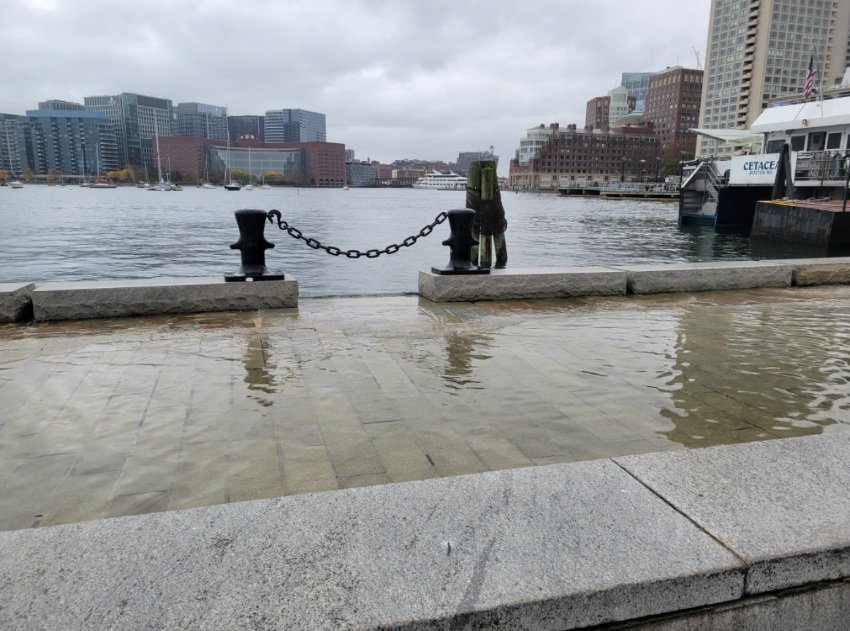Rising sea tides: Effects on Boston and what is being done
The murky salt water that floods Long Wharf during high tide is only the beginning of problems that Boston will have to endure in the next few decades. The flooding of beloved neighborhoods, such as Seaport and Back Bay, and the overflow of the outdated sewage systems that taint the water are all effects from rising sea levels. This crisis is due to climate change that will worsen as time goes on.
With such dire issues occurring, advocacy groups such as Extinction Rebellion (XR), have a main goal of stopping the use of fossil fuels, which directly affects sea level rise.
Jamie McGonagill, the media and messaging director for XR Boston, said protesting fossil fuels is a way to cut to the root of the issue, as greenhouse gasses from climate change causes sea level rise.
“Protesting ‘sea level rise’ makes it easy for detractors to assert that we’re demanding impossible change, whereas the language and intention of ‘no new fossil fuel infrastructure’ is much harder to misinterpret,” McGonagill said.
Over the past couple of years, the Extinction Rebellion has had a multitude of events protesting climate change. This past July, activists held a funeral at Revere Beach to mourn the loss of biodiversity due to the effects of climate change, as well as celebrate what the ocean provides.
To their efforts, McGonagill expressed her surprise to the public’s positive reaction — especially when they directly target people in power. She referenced this past June when activists mooned Massachusetts legislators disrupting a formal senate session. The activists had the words, “Stop Passing Gas,” written on their rear ends in protest of banning new fossil fuel infrastructure.
In July, members of Extinction Rebellion also had the opportunity to meet with the state’s new climate chief.
“She admitted that Massachusetts is not on track to meet our legally mandated climate goals by 2030.” McGonagill said in an email to this reporter. “Afterwards, when one of the three XR Boston representatives who had been present in the meeting approached Hoffer at a public event and greeted her, Hoffer walked away and said that she would no longer speak to members of our organization,”
When questioned about it, Climate Chief Melissa Hoffer declined to answer. Her press secretary Karissa Hand instead sent links to the Climate Report Card, which stated that it’s on track to meet its goals for 2025.
However it also states that Massachusetts still has a lot of work to do to meet climate goals by the year 2030.
McGonagill believes that if Chief Hoffer had the same goal in mind as XR, there would be immediate shutdown of fossil fuel infrastructure, but that has yet to happen.
Negative encounters such as that only encourage XR to continue to find new ways to express the pressing situation of climate change.
“When particularly harsh feedback comes in, I try to hold in my mind the saying ‘First they ignore you, then they laugh at you, then they fight you, then you win,’” says McGonagill. “The climate movement certainly isn’t being ignored now, and when we are fought, I remember that is the final step before victory.”
Outside of the work from XR, there are efforts within the Massachusetts government to aid cities that will be affected by rising tides. The office of Coastal Zone Management has a competitive grant process to provide for communities that are most at risk to sea level rise and to educate and prepare them.
As of earlier this year, Boston had received a $300,000 grant for Tenean Beach/Conley Street in the neighborhood of Dorchester to develop ways to protect the waterfront and neighborhoods that are prone to flooding from sea level rise.
This project included having workshops to inform the public about climate change effects in Dorchester, and introduce flood resilience strategies.
These grants aid in a multitude of coastal resilience approaches, and they have already awarded towns for the year of 2024. Some of which include Braintree, Duxbury, and Salem.
While these are huge steps that have been taken against the effects of sea level rise, and climate change as a whole, there is still a lot more to be done.
“We are all living in a house on fire. The opportunity of any emergency situation is that we each get to discover what we’re made of, and discover what realities we are able to accept under pressure.” said McGonagill.
